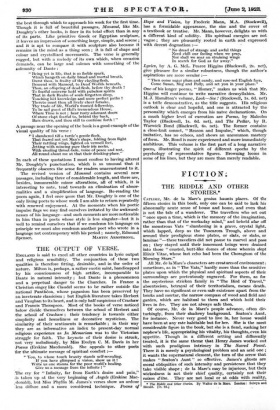THE OUTPUT OF VERSE.
ENGLAND is said to excel all other countries in lyric output and religious sensibility. The conjunction of these two qualities is therefore fitting, desirable, and in the order of nature. Milton is, perhaps, a rather exotic saint, handicapped by his consciousness of high artifice, incomparable to Dante in natural intensity ; but Dante is a phenomenon and a perpetual danger to the Churches. In France a Christian singer like Claudel seems to be rather outside the national Pantheon, whose paganism has been preserved by an inveterate classicism ; but English literature takes Herbert and Vaughan to its heart, and is only half suspicious of Crashaw and Francis Thompson. Most of the books of verse noticed
below divide themselves between the school of Herbert and the schoOl of Crashaw ; their tendency is towards either simplicity and homeliness or decorative mysticism. The similarity of their sentiments is remarkable ; in their way they are as informative an index to present-day normal religions experience as In Memoriam was to the Victorian struggle for faith. The keynote of their desire is struck, 'not very melodiously, by Miss Evelyn C. M. Davis in her Pciems (Erskine Macdonald). She appeals to other poets -for the ultimate message of spiritual comfort :—
" You, to whose touch beauty stands self-revealing, If you have glimpsed a vision, show us it ! Write us one stanza for the poor world's healing. Give us a message from the infinite ! "
.The cry for Infinity, far from Earth's desire and pain," is taken up at the very beginning of Angels (Erskine Mac- donald), but Miss Phyllis M. James's verses show an ardour less diffuse and a more considered technique. Poems of Hope and Vision, by Frederic Mann, M.A. (Stockwell),
has a formidable appearance, the size and the cover of a textbook or treatise. Mr. Mann, however, delights us with a different kind of solidity. His spiritual energies are not vague ; they are pleasantly rooted in earth and expressed with decent dogmatism :-
" No dread of strange and awful things Need chill our feeling when we pray, Nor shall we soar on straining wings In search for God as far away.', Lyrics, by A. G. McL. Pearce Higgins (Blackwell, 2s. net), give pleasure for a similar robustness, though the author's aspirations are more secular :-
" Then come sugar plum and candy, and rose-red English face, Come Susan, Meg and Polly, and set you in your place."
One of his longer poems, " Homer," makes us wish that Mr. Higgins will continue to write narrative decasyllabics. Mr. M. J. Hamilton's volume, Look—See ! (Stockwell, ls. 6d. net) is a trifle demonstrative, as the title suggests. His religious outlook is clear and hopeful, and one is attracted by the personality which emerges from his naive declamations. On a much higher level of execution are Poems, by Malcolm Taylor (Blackwell, ls. 6d. net), and The Pedlar, by R. Warwick Bond (Blackwell, 6s. net). The former contains a close-knit sonnet, " Reason and Impulse," which, though imitative, has no echoes, and shows an uncommon mastery of form. Mr. Bond is more experienced and more immediately
ambitious. This volume is the first part of a long narrative poem, illustrating the spirit of different epochs by the psychology of representative figures. Browning looms in some of his lines, but they are more than merely readable.










































 Previous page
Previous page